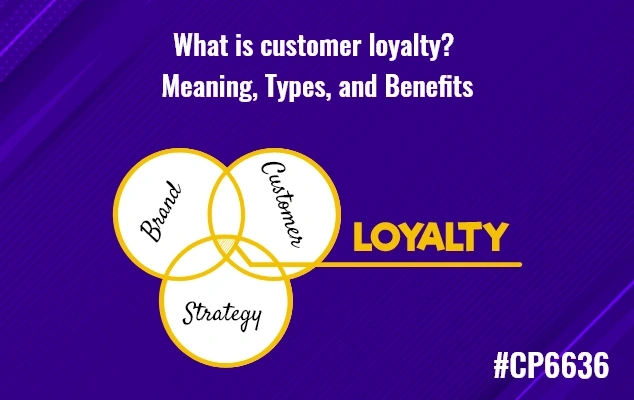What is customer loyalty? Meaning, Types, and Benefits
26 September, 2025
In today’s competitive market, winning a customer once is not enough. The real success for any business lies in keeping that customer coming back again and again. This is where customer loyalty plays an important role. Loyal customers not only spend more but also spread positive word-of-mouth, making them one of the strongest assets for any brand. Customer loyalty is the choice of customers to repeatedly choose your products or services over competitors. It reflects the trust, satisfaction, and positive relationship customers feel toward your brand. Loyal customers are less likely to switch, even if alternatives exist, because they value the experience, connection, and benefits they receive from your brand. In simple words, customer loyalty means building a strong relationship where customers stick with your brand because of consistent value, trust, and satisfaction. Businesses that invest in brand awareness and loyalty often see stronger retention and long-term growth. Customer loyalty can appear in different forms. The most common types are: Customers return for deals, cashback, or points. Loyalty is built on shared values or emotions. Habits and convenience drive repeat use. Customers feel part of a larger group. Customers actively recommend the brand. Customer loyalty brings many advantages to businesses: Higher Retention: Loyal customers keep returning, reducing churn. Increased Revenue: Repeat buyers usually spend more over time. Positive Word-of-Mouth: Brand loyal consumers recommend your business, bringing new customers at no cost. Stronger Brand Value: A steady base of loyal customers strengthens credibility. Lower Costs: Retaining a brand-loyal shopper is much cheaper than attracting a new one. These three elements are closely linked but serve different purposes in the customer journey. Brand Awareness is about recognition. It’s how easily people know and recall your brand. Without awareness, loyalty cannot form. Marketing and consistent identity help build brand awareness and loyalty from the first interaction. Brand Loyalty is deeper. Once people recognize your brand, they may choose it consistently because of trust or quality. For example, someone may know many soda brands but only buy Coca-Cola. This shows how brand awareness and brand loyalty combine to create stronger bonds with brand-loyal consumers. Customer Loyalty is broader and goes beyond just the name. It includes repeat purchases driven by rewards, value, and convenience. A brand-loyal shopper may continue with Amazon because of fast delivery and good service. This highlights how brand awareness and customer loyalty work together to secure repeat business. In short: Awareness attracts attention. Brand loyalty builds attachment. Customer loyalty sustains growth. When brand awareness and loyalty, brand awareness loyalty, and brand awareness and customer loyalty align, businesses gain visibility, trust, and long-term customer relationships. Customer loyalty is more than repeat purchases. It’s about trust and connection. When companies create value and emotional bonds, they turn buyers into brand-loyal consumers who advocate for them. Every brand loyal shopper proves that from awareness to advocacy, loyalty is the true foundation of sustainable business growth.What is Customer Loyalty?
Types of Customer Loyalty
Transactional Loyalty
Example: A brand loyal shopper at Starbucks collects stars for free drinks.Emotional Loyalty
Example: Eco-conscious buyers, showing brand awareness towards sustainability.Behavioral Loyalty
Example: A brand loyal consumer orders food daily from the same app out of routine.Community Loyalty
Example: Nike Run Club members bond over fitness, reflecting strong brand awareness and loyalty.Advocacy Loyalty
Example: An Apple fan posting reviews online shows how brand awareness and customer loyalty create unpaid brand advocates.Benefits of Customer Loyalty
How Brand Awareness, Brand Loyalty, and Customer Loyalty Work Together?
Conclusion-



